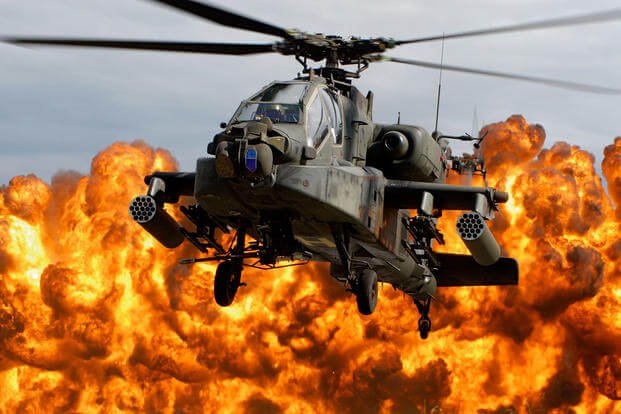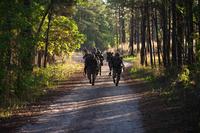Lawmakers on key defense panels have reached a deal on the annual defense authorization bill that would limit the Army's plans to transfer Apache helicopters from the National Guard.
Sen. Carl Levin, the retiring chairman of the Senate Armed Services Committee, and Rep. Howard "Buck" McKeon, the retiring chairman of the House Armed Services Committee, on Tuesday announced a compromise version of the Fiscal 2015 National Defense Authorization Act.
The legislation would allow the Army to transfer as many as four dozen AH-64 Apache attack helicopters from the National Guard to the active component. The service had proposed removing the Guard's entire fleet of 192 Apaches as part of a larger aviation restructuring plan that was driven by automatic budget cuts and estimated $12 billion over five years.
"We expect the Army and ARNG to immediately proceed with appropriate planning and preparation activities for the transfer of up to 48 AH-64 Apache aircraft prior to March 31, 2016," according to a report accompanying the legislation. "Such preparations should include all necessary personnel and materiel-related actions required to facilitate such transfers."
Under the Army's Aviation Restructuring Initiative, or ARI, the Guard would have lost 30 OH-58D Kiowa Warrior scout helicopters, in addition to the Apaches. Under the original proposal, the Guard would have also given up as many as 104 UH-72 Lakota light-utility choppers. But that was revised and the active component planned to purchase those aircraft instead. In all, the Guard was set to lose 222 aircraft and get back half that amount in the form of UH-60 Black Hawk utility helicopters.
Congress is expected to vote this month on the defense bill before members leave for the Christmas holiday recess. Yet even as the leaders of the defense committees pledged agreement on the Army aviation plan -- including support for an independent commission to study the issue -- they hinted that other aspects of the proposal could still take effect.
"We also expect the Army and ARNG to continue the planning necessary for the potential implementation of the rest of the Army's Aviation Restructure Initiative so that disruptions to the readiness of the Army and ARNG are minimized in the event that Congress approves additional elements of the Army's plan beyond March 31, 2016," the report states.
Guard officials have said they've already begun planning for such a move even while pushing for a commission to review the matter.
"The decision's been made to move forward," Brig. Gen. Michael Bobeck, special assistant to the director of the Army National Guard, said in May at the Army Aviation Association of America's annual conference. "We're working through the mechanics of implementation and execution."
Beginning last spring, the Guard distributed a so-called 70-percent solution to states adjutants general and was in the process of refining that plan, Bobeck said. The actual transfer of aircraft was slated to take place over a four-year period beginning in 2016, he said.
If automatic budget cuts known as sequestration remain in effect, the Guard may be forced to turn over its Lakotas, which are used extensively for such stateside missions as border patrol and national-disaster response.
Ten states were to be directly affected by the complete Aviation Restructure Initiative. Nine states were to lose Apache units, including Arizona, Idaho, Mississippi, Missouri, North Carolina, Pennsylvania, South Carolina, Texas and Utah; while Tennessee will lose a Kiowa unit. It wasn't immediately clear which states would be first.
The shift is bound to create "turbulence" for the Guard, as officials seek to soften the impact to those states by transferring helicopters and personnel from other states with more aviation assets, Bobeck said.
The transfer of Apache units to the active-duty component "will cause us to restructure our assault battalions and assault units, so we'll go through a period of time to retrain our attack soldiers to utility pilots, crew chiefs, maintainers," he said.
"We'll also make some adjustments in other states not directly affected by the divestiture," Bobeck said. "We're going to move some other structure from other states -- larger Black Hawk states -- and move some of that into those nine states to try to balance that a little better."
-- Brendan McGarry can be reached at brendan.mcgarry@monster.com




























